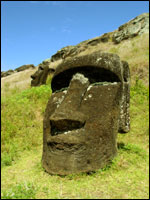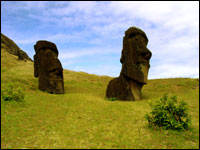




| Day 12 | |
 Waking up early I was still extremely tired. My mood failed to be lifted by the continuing failure of my computer to work or by the fact that my bottom lip was sunburned, blistered and swollen to deformity proportions. In my gloom and sleep deprived haze, I got onto the Internet and emailed Josh �the guru on all this Mac� Weisbuck back in Boston with a plea of HEEELLLPPP!!!! He forwarded my pleas to other Mac gurus in the Boston area. After breakfast and more fiddling with the computer I asked about renting a car. It just so happened that one of the family had a 4x4 Jeep like thing that I could rent for $50 a day, which is the islands going rate. I agreed, but on the proviso that I would be able to get money on a credit card cash advance from the bank. Otherwise I would have to go to a rental company so that I could pay with a credit card. The bank proved ultimately fruitful and I had my first break of good luck for the day. At the last moment before leaving the house, I decided to take with me my Visa card as well as my Amex and MasterCard that I usual take with me. The bank, it turned out, would only do a cash advance on a Visa card. Phew! A top tip when getting your Visa cash advance is to walk into the bank, go to the right hand side and see one of the two guys behind the desks there. Wave your Visa and say "cash advance" followed by the dollar amount. They will go through the whole process of verifying your card, checking you passport and then sending you into the long line to get your money from a cashier. The drive to Rano Raraku took twenty minutes, a far cry from the four hours, with stops, of the pedaled powered day before. I spent all day hanging out amongst the Moai and filming bits for my documentary that I wish to put together for myself. At first I stayed on the outside of the volcano filming some intro shots and cutaways. Following this up, I did a piece about the kneeling Moai that Thor Heyerdahl claimed showed South American influence. He claimed this statue was of the same influence as one found by Lake Titicaca in Peru. The reality is that this Moai, called Tuturi, is more like Polynesian statues. I think that the carver of Tuturi was having a laugh and thought "this'll stump them in 400 years". Elsewhere, I did a piece about the "first Moai". This is a big lump of stone that doesn�t initially look like anything. After staring you see the face that is spread over the top of the rock, the ears morph into the hands and the proportions are all wrong. Katherine Rutledge had this to say; "sdfsdf". The tour guide had nothing to say and her group, after a long spiel about the Moai with the ship carve into it, were told to keep walking along the path and up. No mention of the "first Moai", not even as a guide to direction. Incidentally, Thor Heyerdahl excavated the Moai with the ship carved into it during his expedition in the mid 1950's. Some argue that this ship was the first ship that brought the original settlers to Easter Island, stating that the carving must be old because the statue had to be excavated. I think this a load of tosh. The carving is clearly that of a European ship from the seventeen or eighteen hundreds. Also, any fool can see that the post Moai creating inhabitants of Easter Island enjoyed carving on any bit of rock that was to hand. You see carvings on fallen topknots and flat rock on the floor. Coupled with the fact that the carving is of poor quality and on what would have once been a sacred object. I think that some graffiti artist chose an accessible Moai to scrawl a picture of a visiting European ship. This Moai was later covered up to its neck by a landslip. There, you'll make an archeologist out of me yet. My first view of the inside of the volcano, at about midday, was astonishing. A shimmering blue lake, a Moai encrusted crater and the twinkle of the Pacific Ocean as a backdrop. Oh what joy. With a detailed map of all the Moai discovered by Katherine Rutledge in 1914, I was able to discover that there are some Moai missing. Inevitably some are buried due to land slippage, others are obscured by overgrowth, but one Moai in particular was nowhere to be found. This particular Moai - insert info from KR here.
Close by to Ahu Tongariki the standing Moai are gigantic. Standing under the largest, I didn't even reach its protruding stomach. With the Moai toppled long into the past, in 1960 the Ahu itself was still standing at over twenty meters in height, until a tidal wave destroyed the Ahu, flinging the Moai great distances inland and sucking some back into the sea. Of the twenty-five or so originally standing Moai, fifteen are now watching Rano Raraku on the rebuilt Ahu. As all the locals will tell you, the Japanese restored this Ahu. Private company, University, public donations? I don�t have a clue, but I'm glad the restoration took place. The day�s expedition came to end swimming at Anekana beach. Absolutely wonderful. The water was blue and cool, breaking onto a beach of fine white sand. The sun was hot and the waves were large enough to body surf. I can tell you this for free, I'd prefer to be doing this on a Tuesday rather than sitting behind a desk at work. The journey home was another quick twenty minutes. Much to my surprise my computer started to work again (only to be not working in the morning). On a whim, with only thirty minutes to spare, I decided to catch the sunset up at Orongo village. I sped up the Rano Kau in my Jeep. With a perfect view of Cooks bay, I saw the Japanese cruise ship �Peace Ship� majestically coming in to weigh anchor. With just a couple of minutes to spare, I settled down to see the last of the fabulous sunset. Minutes after the sun slipped beneath the horizon, the temperature plummeted. T-shirt, shorts and sandals weather it suddenly was not. I turned to head down the volcano, though not before standing high on a rock, at the craters edge, with out flung arms and letting the roaring wind whip through my fingers, across my face and around my body. I swear to God that I shouted; "You don't get this every day in Boston"! The restaurant �La Taverne du Pecher�, which unsurprisingly is run be a Frenchman, had exceptional food. For Easter Island the $16 price tag for the delicately cooked Maki Maki (fish) with fresh vegetables from the market and rice is a bit steep, though to have a meal of this quality in the USA you would pay a lot more. An American couple came into the restaurant just as I was leaving. Unfortunately for them, it was too late for food so I suggested the restaurant recommend to me with the delicious Tuna Empanadas. Instead of going there, I was invited for a drink, so the evening ended in a bar that was co-incidentally also owned by the Frenchmen. I had given some absolute gems of advice to the American couple, advising on the best way down the Rano Raraku crater interior earlier in the day and we chatted and drank extremely alcoholic fruit juices until the early hours. I could have done without that, though it was really pleasant. I had an early start planned for the morning. | |
 Eventually, tired and with my water running out, I made my way back outside the crater. I found "the shot" of Easter Island. It�s the one that you always see, of two Moai at slightly odd angles, heading in different directions. I took the must-do photos and headed out. It was just past five o'clock in the afternoon.
Eventually, tired and with my water running out, I made my way back outside the crater. I found "the shot" of Easter Island. It�s the one that you always see, of two Moai at slightly odd angles, heading in different directions. I took the must-do photos and headed out. It was just past five o'clock in the afternoon.